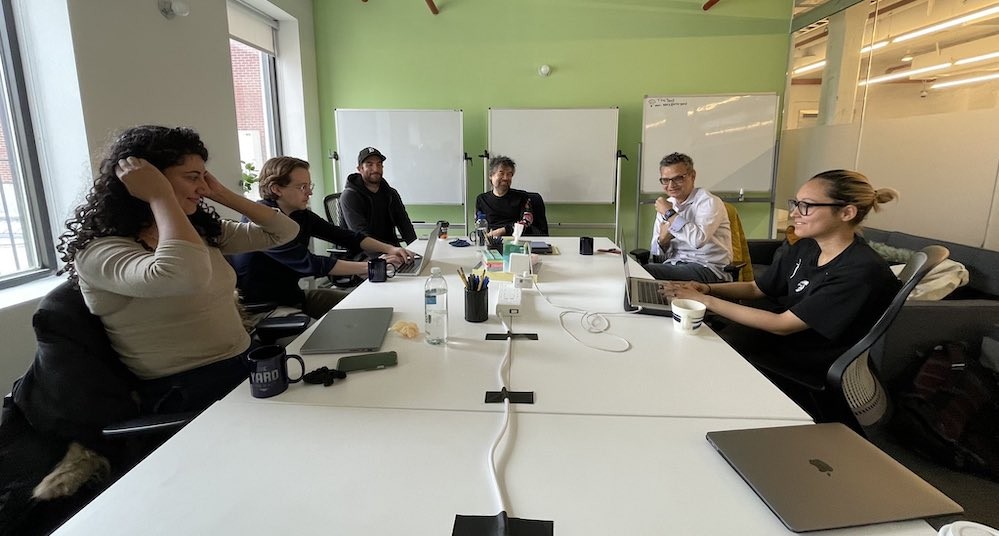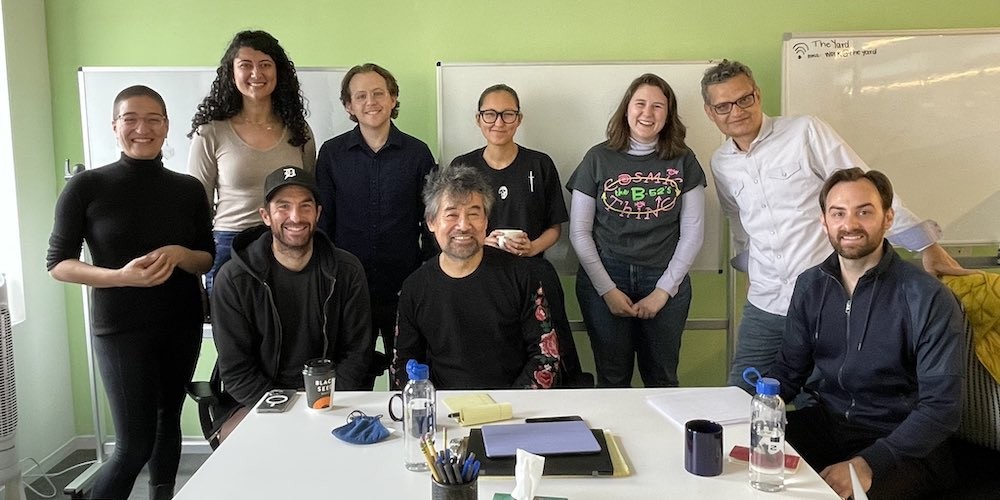David Henry Hwang’s 'Billion Dollar Whale' TV Adaptation Features Team of Columbia Artists
Professor David Henry Hwang is leading the creation of Billion Dollar Whale, a new television series from SK Global and Westward, which Hwang is adapting from the bombshell book of the same name. Hwang also serves as Executive Producer on the show alongside Film alumnus and co-founder of Westward Productions, Beau Willimon '03 (CC '99)—and those aren't the only Columbia connections. Nearly all the members of the show's producing and writing teams are Columbia alumni, many of them graduates of the Theatre Program.
Dramaturgy alumna Anchuli Felicia King ’18 is another executive producer for the series, and Adjunct Assistant Professor Rogelio Martinez '96 is a co-producer. Working closely with Hwang in the writers' room are Playwriting alums Daniel Rattner '20 and Luz Lorenzana Twigg '23—who serve as Writer's Assistant and Production Assistant, respectively—and Sylvia Khoury (CC '12), who serves as Story Editor. Both Twigg and Rattner studied under Hwang, and Twigg was recently published alongside Hwang in Decentered Playwriting, a theatre textbook.
Written by Wall Street Journal correspondents Tom Wright and Bradley Hope, Billion Dollar Whale details the exploits of Malaysian fugitive businessman Jho Low, who manipulated the Malaysian Prime Minister at the time to create a sovereign wealth fund that Low was able to exploit for his own interests. The fraud is considered one of the largest in history and Low is under investigation by authorities in Malaysia, Luxembourg, Singapore, Switzerland, and by the U.S. Department of Justice. The book was a bestseller and made its writers finalists for the 2016 Pulitzer Prize.
The television series closely follows the structure and plot of the book, dramatizing Low's crimes in a darkly comic style. The writing team assembled by Hwang is distinctly theatre-leaning, with many members of the team bringing extensive backgrounds in playwriting to the project. “I think the key to establishing tone as a showrunner starts with assembling the right group of writers," said Hwang. "I engaged a room of playwrights (who also write for TV), because I believe we each bring strong and unique artistic voices into the room. Moreover, playwrights have experience in production and are therefore used to the give-and-take of collaboration. I also wanted a diverse group of writers—particularly because we're telling an international story with locations in Asia and the Middle East as well as the UK and USA—to bring their respective perspectives and de-center whiteness.”

For many of the writers, navigating the similarities and differences between theatre and television writing has been an exciting aspect of the project. “Theatre is a highly collaborative art form, so I think that ethos lends itself naturally to working in a television writers’ room, which at times could feel like a massive group project,” said Rattner.
“A lot of it felt familiar because the heart of it is deep character work," echoed Twigg.
Keeping that focus on character work was important to the team throughout the detailed process of shaping the script, especially considering the complexity of the original story. "We [have to] break down moments from the book and shape them into story,” Martinez said. “Billion Dollar Whale involves tricky financial schemes, so we often review the fraud details to ensure we're getting it right. But beyond that, we also spend time focusing on the families involved. It's easy to get caught up in the excitement of theft and forget that characters are defined by their families, friends, and the company they keep.”
Thankfully for Martinez and the rest of the team, recognizing the importance of character development is easy when working with fellow Columbia-trained artists. “I love the fact that everyone has a relationship with Columbia," he said. "We have a common language—a language that extends to the creative.We all have similar learning experiences (or teaching styles)—for example, we all understand character is the most important thing when writing.”
Rattner has had a similar experience in the writers' room, sharing: “Even though I hadn’t met most of the people going into the room, the fact that we had that shared Columbia experience and knew people in common fostered a level of familiarity that I think allowed us to dive into the work right away with more trust and less apprehension than we may have had otherwise.”
Having that connection and shared experience helped keep the work smooth even through some major interruptions.“We put together a ten-week, in-person room, and had gotten through six weeks when the writers' strike hit," said Hwang. "This led to a five-month hiatus until the labor action was resolved (generally in favor of the writers, I'm happy to say). Then we completed our remaining four weeks. At this point, we have finished a pilot script, ‘broken’ Season One, generated a Format for that season, and begun work on individual episodes.”
According to Hwang, this is just the beginning for Billion Dollar Whale, and he noted the success of the room he’s assembled with pride. “Though it's impossible to fully determine this in advance, I tried to gather a group that I believed would be kind and respectful to each other," he said, "which turned out to be the case!”
"It was a very, very kind room,” agreed Twigg. “I think that shared experience—and also the fact that David is an incredibly kind person—created a great shorthand where everyone trusted each other implicitly. It was amazing to watch [the writers] disagree—they were so congenial about it, and there was a lot of laughter in the room. I learned a lot from watching people think out loud.”
For more about the story behind Billion Dollar Whale, check out the book here.
